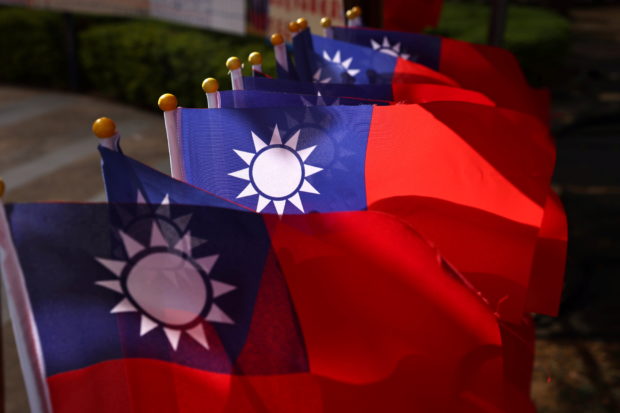Taiwan seeks inclusion in Interpol, UN climate org anew

Taiwan flags can be seen at a square ahead of the national day celebration in Taoyuan, Taiwan, October 8, 2021. REUTERS/Ann Wang/Files
MANILA, Philippines — Taiwan is once again seeking participation in global organizations — this time with the International Criminal Police Organization (Interpol) and the United Nations Framework Convention on Climate Change (UNFCCC) — as part of its bid to help strengthen global systems.
Taiwan in separate statements sent by the Taipei Economic and Cultural Office in the Philippines (TECO) said that international bodies should do away with political interference and let the island nation — which claim independence from the People’s Republic of China — participate in global efforts to stop crime in the case of Interpol, and manage climate change with UNFCCC.
In terms of the UNFCCC, which is holding its 26th Session of the Conference of the Parties (COP26) from October 31 to November 12, Taiwan environmental protection Minister Chang Tzi-chin said that having the country at the forum would be a great help to other nations trying to counter climate change.
“As a responsible member of the international community, Taiwan strives to integrate with global efforts to mitigate climate change. President Tsai Ing-wen declared on this year’s Earth Day (April 22) that realizing net-zero emissions by 2050 is the goal of the world, including Taiwan,” Chang said in a statement.
“At the 33rd meeting of the National Council for Sustainable Development, Premier Su Tseng-chang announced the inclusion of the 2050 net-zero emission target in the amendment bill for the Greenhouse Gas Reduction and Management Act, demonstrating Taiwan’s determination to actively reduce carbon emissions,” he added.
Furthermore, Chang noted that the COVID-19 pandemic also showed that Taiwan’s industries and its approach to climate issues are very reliable, and would set a good example if they are allowed to join such high-level global meetings.
The way Taiwan approaches a net-zero emissions deadline — or the time when a country stops adding more greenhouse gasses to stop global warming — can also be emulated by other countries still lost for ways to implement such programs.
“The Taiwan government aims to formulate a clear and comprehensive carbon reduction path and green growth strategy. Cooperation with private enterprises plays a critical role in these efforts. The Taiwan Climate Alliance, formed by eight ICT companies, has set the goal of using renewable energy in 100 percent of their manufacturing processes by 2050and will lead other manufacturers in the supply chain to jointly reach this target,” Chang said.
”In addition, the Taiwan Alliance for Net Zero Emission, formed by traditional manufacturing, technology, finance, and service industries, seeks to attain net-zero carbon emissions at office sites by 2030 and at production sites by 2050,” he added.
On Interpol
With the Interpol, Taiwan’s National Police Agency says it supports their government’s request for an observer role in the said global network, so that they contribute to international security and anti-crime efforts especially with Taiwan establishing itself as a major hub in Asia.
“Political interference has led to Taiwan’s exclusion from INTERPOL for 37 years, creating a gap in the international security network and causing concern for law and order in countries across the globe,” the National Police Agency said.
“Given the rampant growth of terrorism and cross-border crimes today, it is essential for police worldwide to work together to create a seamless global law and order protection system. Taiwan police wish to cooperate with their counterparts in other countries to jointly safeguard social justice,” it added.
The National Police Agency said that excluding Taiwan from the Interpol actually does more harm than good, as its lack of participation means local police cannot fully cooperate with other nations in trying to bolster global security.
Taiwan’s police said that drug-related cross-border crimes being committed by people sharing a similar language background — like Chinese, Taiwanese, and people of Chinese descent in Southeast Asia — have become more common recently, with police operations in the Philippines and in Malaysia arresting Chinese speakers as proof.
This makes Taiwan’s membership in the Interpol even more pressing, the National Police Agency said.
“Its continued exclusion from Interpol undermines the global endeavor to fight terrorism, illicit drugs, telecom fraud, cybercrime, and other new forms of transnational crime, thereby diminishing the integrity and effectiveness of the international security network,” the National Police Agency said.
“As cross-border drug trafficking rings operate in many nations and illicit drug activities are often relocated in response to global market mechanisms, law enforcement agencies face mounting difficulties in carrying out investigations. As a result, it has become even more imperative for Taiwan police to work with their counterparts in other countries on joint prevention efforts,” it added.
Taiwan has been left out of major international bodies like the United Nations and the World Health Organization due to the one-China policy, which recognizes the People’s Republic of China (PRC) as the sovereign state and Taiwan as a mere province of the mainland.
Taiwan maintains that it was never governed by the PRC and that it is a democratic state independent from the Chinese government.
The struggle between the two Chinas can be drawn as far as the country’s civil war in the 1940s, where nationalist Chiang Kai-shek and his Kuomintang fought against Mao Zedong’s communist party for control of the mainland.
After the communists seized control of a large part of mainland China, Chiang relocated his government to Taiwan, claiming that the Republic of China is still active.
This is not the first time Taiwan has called for a more active role in international bodies like the UN: last May, President Tsai said that it is a loss for the world when Taiwan was not invited to the World Health Assembly despite its success story.
EDV